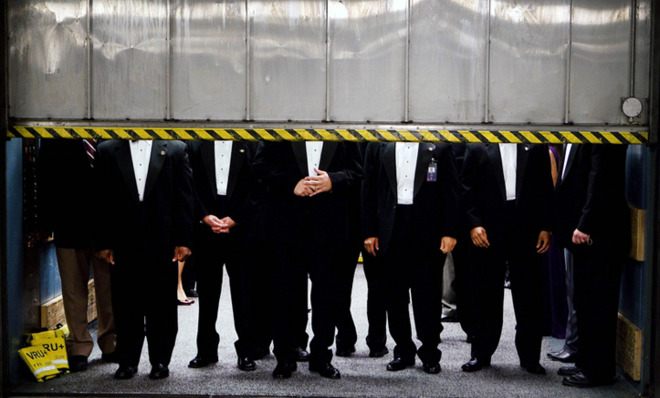This is the wrong way to respond to the Secret Service fiasco
It's almost always foolish to solve government problems with government spending


A free daily email with the biggest news stories of the day – and the best features from TheWeek.com
You are now subscribed
Your newsletter sign-up was successful
MSNBC's Chris Hayes is a liberal's liberal. But one of his observations about the U.S. Secret Service scandal was quintessentially conservative.
After it was revealed that a White House intruder got much further than originally reported before finally being apprehended, Hayes tweeted:
This pattern isn't limited to security screw-ups. Any government program that fails or underperforms is said to be underfunded. When did any politician or bureaucrat see a problem that couldn't be solved by giving some government agency more money and power?
The Week
Escape your echo chamber. Get the facts behind the news, plus analysis from multiple perspectives.

Sign up for The Week's Free Newsletters
From our morning news briefing to a weekly Good News Newsletter, get the best of The Week delivered directly to your inbox.
From our morning news briefing to a weekly Good News Newsletter, get the best of The Week delivered directly to your inbox.
Nobody's happy with No Child Left Behind? That can only be due to the Republicans' failure to lavish more taxpayer dollars on the controversial federal education law. The late Ted Kennedy, George W. Bush's main Democratic partner on No Child Left Behind, said as much a decade ago: "The tragedy is that these long overdue reforms are in place, but the funds are not."
By the Heritage Foundation's estimate, the federal government has spent $22 trillion on anti-poverty programs over the past 50 years, as measured in constant 2012 dollars. If the progress has been inadequate, then surely there was a need to spend trillions more, right?
When the new Secret Service scrutiny uncovered another incident where an armed convict got close to the president, The New Republic's Brian Beutler argued that a big part of the problem is lax gun control. Sean Davis of The Federalist retorted that the gun-toting man was undeterred by already being in violation of several existing laws.
Davis concluded, "In short, despite clear prohibitions against this individual possessing a firearm, concealing a firearm, and bringing a firearm into a federal building, this individual managed to possess a firearm, conceal a firearm, and bring a firearm into a federal building."
A free daily email with the biggest news stories of the day – and the best features from TheWeek.com
As a result of this history, some conservatives laughed at Hayes. But to Hayes' credit, he has written that "the conservative critique of bureaucracy" is "most applicable to the security sphere."
If liberals fail to recognize the limits of government when it comes to domestic programs, conservatives often forget them abroad. When it comes to military interventions, that Burkean skepticism of big government projects goes out the window. When it comes to nation-building in the Middle East, concern about the "fatal conceit" is jettisoned.
Are there problems in Iraq? Well, then clearly what is needed is more money, more troops, and a longer stay. The only reason the country is disintegrating is that the Democrats naively didn't commit enough resources. Why, the military says so!
But a government that can barely protect the Green Room is obviously going to have trouble securing Iraq outside the Green Zone. A country that struggles to secure its own borders is bound to make mistakes drawing new borders in foreign lands. How can Uncle Sam be expected to create a functioning democracy in the Middle East when he isn't up to the task of creating a functioning website?
The military is obviously a more heroic institution than the Department of Motor Vehicles, and it frequently deals with problems that can only be solved through force. But that's true of the Secret Service, too. Agent Tim McCarthy literally took a bullet for President Reagan in 1981.
Moreover, brave soldiers and sailors frequently act based on decisions made by politicians and technocrats. And that decision-making process isn't immune from bureaucratic infighting, shoveling money to favored constituencies, and grandiose schemes hatched by people far from the facts on the ground.
The problem isn't confined to places like Iraq. In the aftermath of the 9/11 terrorist attacks, Congress passed the Patriot Act, accepted expanded surveillance, and created the Department of Homeland Security long before inquiries into what the government had possibly done wrong were completed.
Unlike virtually any other entity in American life, when government fails, it can always ask for more money and power.
As it happened, Secret Service Director Julia Pierson fell on her sword after her agency mishaps. Sometimes there is some measure of bureaucratic accountability rather than the usual rush to throw money at problems.
Nevertheless, liberals should learn to be more skeptical when government agencies claim that problems can be solved by boosting their budgets and growing their power. In fact, so should conservatives.
W. James Antle III is the politics editor of the Washington Examiner, the former editor of The American Conservative, and author of Devouring Freedom: Can Big Government Ever Be Stopped?.
